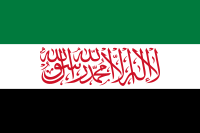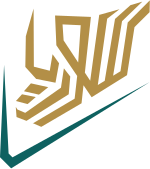This article needs additional citations for verification. (December 2017) |
 Areas under control of various opposition groups as of January 2024 Syrian Salvation Government (Tahrir al-Sham) | |
| Status | Unrecognized quasi-state Designated as a terrorist organization |
| Capital and largest city | Idlib |
| Official languages | Arabic |
| Religion | Islam |
| Government | Unitary authoritarian theocratic Islamic state |
| Prime Minister | |
• 2017 | Ali Keda |
| Legislature | General Shura Council |
| Historical era | Syrian civil war |
| Currency | Syrian lira Turkish lira (de facto),[1][2] |
 Flag [3]  Emblem of the Syrian Salvation Government[4] | |
| Formation | 2 November 2017 |
|---|---|
| Website | syriansg |
| Legislative branch | |
| Legislature | General Shura Council |
| Executive branch | |
| Prime Minister | Ali Keda |
| Main body | Cabinet |
| Appointed by | General Shura Council |
| Headquarters | Idlib, Syria |
| Departments | 9 ministries |
The Syrian Salvation Government (Arabic: حكومة الإنقاذ السورية, romanized: Ḥukūmat al-ʾInqādh al-Sūriyya) is a de facto alternative government of the Syrian opposition in Idlib Governorate, formed in early November 2017 under the initiative of the Hay'at Tahrir al-Sham (HTS) rebel coalition in the context of the Syrian civil war.[5] There followed weeks of conflict between the Syrian Salvation Government (SSG) and the Syrian Interim Government (SIG), with reports of Hayat Tahrir al-Sham unilaterally disbanding several SIG-supported local councils across northwestern Syria.[5]
The SSG is led by a prime minister (currently Ali Keda, since 18 November 2019) who is elected by a legislative body named the General Shura Council, which is headed by a president (currently Mustafa al-Mousa, since 24 April 2020). Officially, HTS has declared its independence from the civilian administration of the Salvation Government, describing the relationship as a "partnership" to provide security to the people of Idlib and offer an alternative to the Ba'athist government. Some analysts have disputed such claims, asserting that HTS maintains control over SSG's security and economic departments and uses SSG as its political front.[6]
The government's education ministry supervises the formal schooling system in Idlib, with more than 550,000 students, 1,800 schools and 12 universities as of 2022. These include roughly 950 schools directly operated by the ministry and employing nearly 12,500 staff members, in addition to the private education system authorized by the SSG. Curriculum has developed the pre-2011 Syrian syllabus in partnership with UNICEF; teaching maths, science, English, history, etc. Anti-religious elements in the national syllabus have been deleted.[7][8]
- ^ Ashawi, Khalil (28 August 2018). "Falling lira hits Syrian enclave backed by Turkey". Reuters.
- ^ Ghuraibi, Yousef (1 July 2020). "Residents of northwestern Syria replace Syrian pound with Turkish lira". Enab Baladi. Idlib. Archived from the original on 5 July 2020. Retrieved 28 January 2022.
- ^ Borhan, Hasan (11 December 2018). "Salvation Government adopts new flag instead of Syrian Revolution; detentions and kidnappings occure [sic] in Idlib and Daraa". smartnews-agency.com. SMARTNews Agency. SMART news. Archived from the original on 7 June 2019. Retrieved 7 June 2019.
- ^ https://www.noonpost.com/sites/default/files/styles/article-main/public/field/image/hkwm-lnqdh-lswry-ljdw-wlmsyr-780x405.jpg?itok=H1XQF6Ny[permanent dead link] noonpost.com
- ^ a b "HTS-backed civil authority moves against rivals in latest power grab in northwest Syria". Syria Direct. 13 December 2017. Archived from the original on 19 September 2018. Retrieved 14 November 2018.
- ^ Fahim, Kareem (2 January 2022). "Former al-Qaeda affiliate in Syria seeks to soften its brand". Washington Post. Archived from the original on 24 March 2023. Retrieved 31 March 2023.
- ^ Almustafa, Aamer (9 June 2023). "Education System in Northwestern Syria: A Long Road Ahead". The Tahrir Institute for Middle East Policy. Archived from the original on 9 June 2023.
- ^ Fahim, Kareem (2 January 2022). "Former al-Qaeda affiliate in Syria seeks to soften its brand". Washington Post. Archived from the original on 24 March 2023. Retrieved 31 March 2023.

